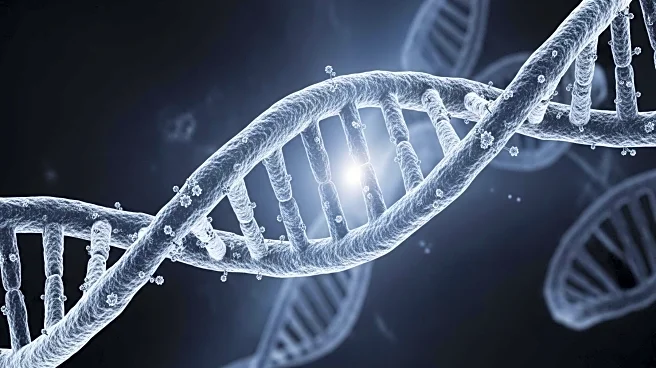What is the story about?
What's Happening?
A recent study published in the journal Nature has uncovered the essential role of ancient viral DNA in the early stages of human embryo development. Nearly 9% of the human genome consists of endogenous retroviruses (ERVs), remnants of ancient viruses that integrated into our ancestors' DNA millions of years ago. The research focused on a specific ERV known as HERVK LTR5Hs, which became part of human DNA after diverging from Old World monkeys. Using human blastoids, 3D models that mimic early embryonic structures, researchers demonstrated that these viral elements are crucial for the pre-implantation stage of development. When LTR5Hs elements were deactivated, the blastoids either perished or became disorganized, indicating their vital role in early human development.
Why It's Important?
This discovery highlights the significant impact of ancient viral DNA on human biology, challenging the notion of these genetic remnants as mere 'junk.' The study reveals that LTR5Hs elements act as enhancers, boosting the activity of nearby genes crucial for early development. This finding could reshape our understanding of genetic regulation and evolution, emphasizing the adaptive reuse of viral DNA in human development. The research also underscores the complexity of genetic interactions and the potential for ancient DNA to influence modern human biology, with implications for developmental biology and genetic research.
What's Next?
Future research may explore the broader implications of ERVs in human development and disease. Understanding the regulatory mechanisms of these viral elements could lead to advancements in genetic therapies and developmental biology. Scientists may also investigate other ERVs and their roles in different stages of human development, potentially uncovering new genetic pathways and therapeutic targets. The study opens avenues for exploring how ancient viral DNA continues to shape human biology and its potential applications in medicine.
Beyond the Headlines
The study raises ethical considerations regarding genetic research and manipulation, particularly in the context of human development. It also prompts a reevaluation of the evolutionary significance of viral DNA, suggesting that these elements may have played a crucial role in human evolution. The findings could influence cultural perceptions of genetic 'junk,' highlighting the intricate interplay between ancient and modern genetic material in shaping human life.
















